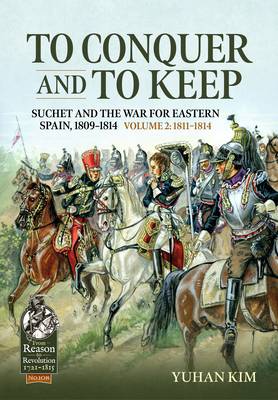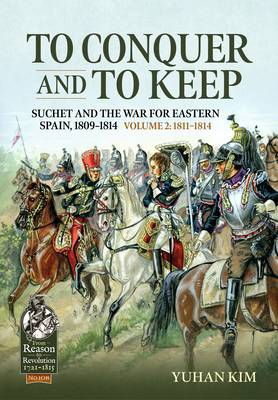
- Retrait gratuit dans votre magasin Club
- 7.000.000 titres dans notre catalogue
- Payer en toute sécurité
- Toujours un magasin près de chez vous
- Retrait gratuit dans votre magasin Club
- 7.000.000 titres dans notre catalogue
- Payer en toute sécurité
- Toujours un magasin près de chez vous
To Conquer and to Keep - Suchet and the War for Eastern Spain, 1809-1814
Volume 2 - 1811-1814
Yuhan Kim
48,95 €
+ 97 points
Format
Description
Napoleon once famously remarked 'If I had had two Marshals like Suchet I should not only have conquered Spain, but have kept it'. Louis-Gabriel Suchet was one of the few French commanders to leave the Peninsular War with his reputation enhanced, and the only one to win his marshal's baton in that war. When Suchet was first appointed to take command of French forces in Aragon in 1809 as a général de division, the French were on the verge of losing control over that province. Through a string of brilliant battlefield victories and sieges against Spanish regular forces as well as an initially successful counter-guerrilla campaign, Suchet managed to not only secure French control of Aragon, but moved on to conquer Lower Catalonia and Valencia as well. Like all French commanders in the Peninsular War, Suchet was faced with the challenges of Spanish popular resistance, but stood out above his colleagues for his notable success in pacifying Aragon. Yet despite initial triumphs in 1809-1811 against the 'traditional guerrilla', Suchet's counter-guerrilla policies were less successful than is often popularly perceived. As the war went on, French resources became thinly stretched, while conversely, the guerrilla war was increasingly spearheaded by Spanish regular forces to great efficiency, which contributed to the eventual collapse of French control in Eastern Spain.
Despite being universally accepted as among the best of Napoleon's marshals, the pivotal role Suchet played in the Peninsular War has largely been overlooked thus far. Through analyzing a variety of sources from both French and allied perspectives, ranging from modern viewpoints to those who saw the war themselves, Yuhan Kim examines both Suchet's successes and failures in his sieges, battles, counter-guerrilla operations, and administration. Each of Suchet's major actions, as well as those fought independently by his subordinates, is explained in extensive detail with maps and orders of battle. This second volume takes a detailed look at the pivotal, but hitherto misunderstood, Battle of Sagunto and the campaign leading up to it, which is analyzed to incorporate new Spanish research that reconstructs the historical narrative of Suchet's climactic battle against Joaquin Blake. Victory at Sagunto was followed by the fall of Valencia, and then a lengthy struggle, lasting to the end of the war, to hold on to what had been conquered in the face of resurgent Spanish armies and a British expeditionary force.
Despite being universally accepted as among the best of Napoleon's marshals, the pivotal role Suchet played in the Peninsular War has largely been overlooked thus far. Through analyzing a variety of sources from both French and allied perspectives, ranging from modern viewpoints to those who saw the war themselves, Yuhan Kim examines both Suchet's successes and failures in his sieges, battles, counter-guerrilla operations, and administration. Each of Suchet's major actions, as well as those fought independently by his subordinates, is explained in extensive detail with maps and orders of battle. This second volume takes a detailed look at the pivotal, but hitherto misunderstood, Battle of Sagunto and the campaign leading up to it, which is analyzed to incorporate new Spanish research that reconstructs the historical narrative of Suchet's climactic battle against Joaquin Blake. Victory at Sagunto was followed by the fall of Valencia, and then a lengthy struggle, lasting to the end of the war, to hold on to what had been conquered in the face of resurgent Spanish armies and a British expeditionary force.
Spécifications
Parties prenantes
- Auteur(s) :
- Editeur:
Contenu
- Nombre de pages :
- 312
- Langue:
- Anglais
- Collection :
Caractéristiques
- EAN:
- 9781804513965
- Date de parution :
- 23-11-23
- Format:
- Livre broché
- Format numérique:
- Trade paperback (VS)
- Dimensions :
- 170 mm x 246 mm
- Poids :
- 816 g







